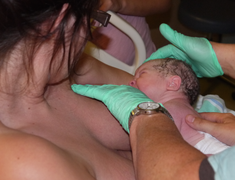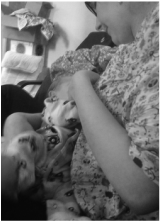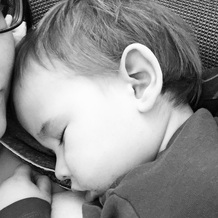 If you didn't already know, yesterday marked the end of another World Breastfeeding Week. Breastfeeding is something that is extremely close to my heart. I know, I know, shocking, an ND who loves breastfeeding, who would have thought! To be completely honest, I didn't even realize it was Breastfeeding Week until all these beautiful images of nursing moms and babes started popping up on my social media feeds! What I am still a little shocked by is all the negative comments, but what's worse the misconceptions surrounding breastfeeding. I have been breastfeeding now almost continuously since August 23, 2011 (5 years!) when my daughter was born. Admittedly, I had a relatively easy transition to breastfeeding. Don't get me wrong...there were a lot of tears at first and it was definitely an adjustment, but, I was lucky to have an amazing team behind me- including a very supportive husband, an incredible midwife, wonderful ND friends/doula, a great letdown and more than adequate supply. Coupled with my ND training and knowledge surrounding breastfeeding- including having had the opportunity to shadow in Dr Jack Newman's Breastfeeding Clinic in Toronto, I got into the swing of things pretty quickly. It was definitely a challenge at first since it took about 3 days for my milk to come in and by that time I had a lot of nipple pain and was feeling frustrated. The morning of the third day my midwife came to our house to check on us (one of the MANY perks of having a midwife) and I just sat on the bed and burst into tears. I laugh about it now and even at the time my midwife kind of chuckled and said my hormones would be a bit of a rollercoaster, that it would be fine and it was completely normal. That afternoon my milk came in and it was like a 180. Not quite all rainbows and butterflies but closer. I nursed my daughter until she was a few months past 2 years old. The only reason I stopped then was because I was pregnant with my son and I have less than stellar pregnancies, ie. severe nausea and vomiting, and I just couldn't be pregnant and nursing a toddler at the same time. About 6 months later my son was born and I picked up nursing where I had left off, though my son did have a severe tongue tie that needed to be clipped. My son is now 2 years and 4 mos and we are still nursing but, now only 3 times a day- mornings, before nap and bedtime.  Yes, you read that correctly. Yes, my son is over 2. Yes, he is still nursing. And yes, I've heard it all, especially since my in laws are Irish and Ireland has not only the worst breastfeeding rates in Europe but according to a recent Lancet article, the world. Though my in laws don't usually give me their advice on parenting- partly because I think they are slightly frightened by me and my strong beliefs- but they will make the offside comment. Like when we talk about visiting them at a later date and the possibility of my husband and I leaving the kids with them in Ireland and the two of us going on a mini vacay to Italy. Last time I respond that it probably won't work on our next visit because my son may still be nursing. My MIL responded with shock, "He'll be 3!!!" My response, "So? If he wants to nurse until he's 9, I don't care." The look of horror on her face....priceless.  Obviously, I don't actually intend on continuing to nurse my son until he is 9. But I probably will until he finishes taking naps since nursing at nap time is my guarantee that he will take his (2+ hour) nap in the afternoon and like breastfeeding, I am strong believer in regular, adequate sleep. So, probably until he is about 3 years old. My first response to these 'opinions' from others is simply asking if they were aware that the World Health Organization recommends breastfeeding until AT LEAST 2 years of age. Because it does. This usually nips the conversation in the bud, because really, how do you argue with the WHO. But even if you want to ignore the WHO, there are innumerable reasons why breastfeeding is so important. I could go on and on about all the reasons I love breastfeeding- the convenience, the fact it's free, the closeness, the quiet moments with my babies....but for the purpose of this blog post, I'll stick to the facts. Everyone's heard it "Breast is best!" but that implies that the standard is artificial feeding and breastfeeding has benefits. In reality, the standard is breastfeeding, which actually means, artificial feeding carries risks. What risks you might ask? Good question- let's talk about them!
And there are also benefits to the mother including: reduced blood loss during labor and delivery due to increased contractions of uterus; reduced risk of developing breast cancer and ovarian cancer- and the more months of breastfeeding the lower the risk; reduced risk of developing Type 2 Diabetes (link above); improves weight loss after pregnancy; and reduces risk of metabolic syndrome, abnormal lipid profile, high blood pressure and coronary artery disease (here, here, here, here). I do want to say this information isn't to make anyone feel badly. There are women who despite everything are still unable to breastfeed. It's the reason 'wet nurses' have been around for generations and why there is a need to have formula as an option. However, this is often devastating for women who have their heart set on breastfeeding their child. I also know women who aren't able to breastfeed, though they can produce milk, and continue to pump and give their babies breastmilk from a bottle. And I have to say, hats off to you! That is serious dedication and literally double the work!
I do however, belief in true informed consent. Marketing is great now a days, and it's why there have been motions to limit and control marketing of infant formula to the public (even by the CDC). I have heard more than once the comment that, "Formula now is just as good as breast milk." It's not. It never will be. It never can be. That is a simple truth. They will never be able to recreate the intricacies of breastmilk on an assembly line. But there are many factors to having a good and successful breastfeeding experience and a big part of that is having the right support team behind you. Start preparing to breastfeed before baby even arrives. Know the lactation consultants and health professionals around you and breastfeeding support groups like La Leche League. Make sure your partner understands and supports you. Remember every baby/birth/latch is different. A poor experience with one child doesn't automatically mean you will have a poor experience with a subsequent child. See if what went 'wrong' the first time can be changed for the second time. If breastfeeding is not possible, there are things that can help mediate some of the risks (such as certain supplements), though not all of them (such as lack of immune factors) can be avoided. Breastfeeding can be one of the most amazing experiences for a new mom but it's not easy and having your team can make all the difference! Disclaimer: Naturopathic Doctors strive to provide individualized health care. The information contained in these topics is not intended nor implied to be a substitute for professional medical advice, it is provided for educational purposes only. This information shouldn’t take the place of seeing an ND for individualized health recommendations.
0 Comments
|
AuthorWrite something about yourself. No need to be fancy, just an overview. Archives
August 2016
Categories
All
|

 RSS Feed
RSS Feed
